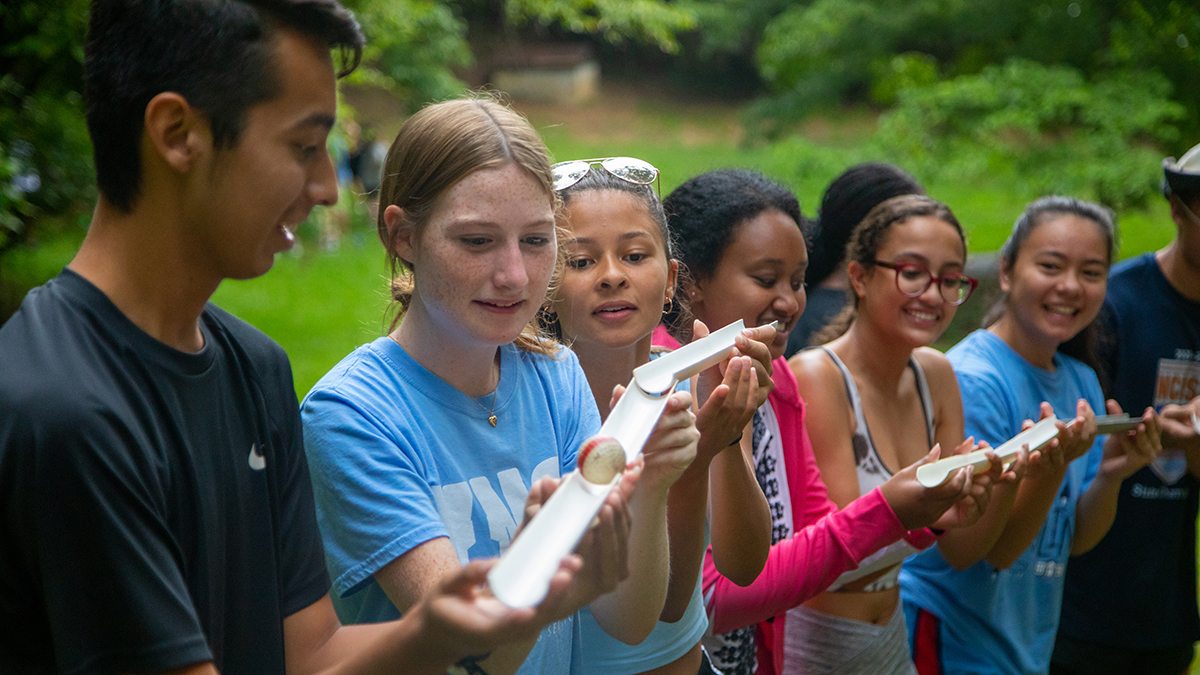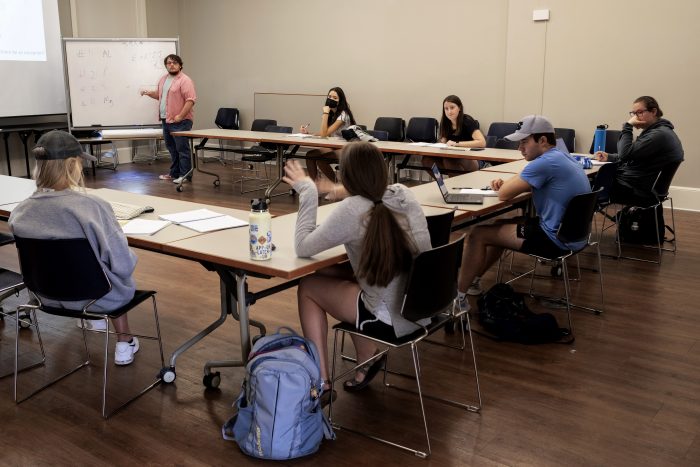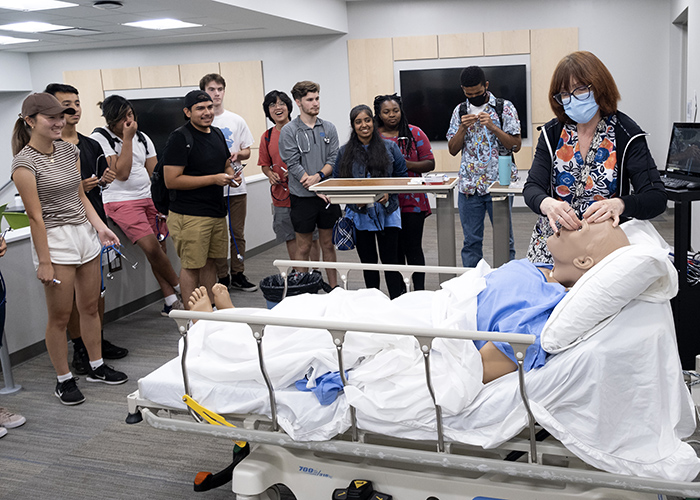Center for Student Success is ready to empower all Tar Heels
The Center for Student Success brings together several offices that help Tar Heels achieve their academic and personal goals.

During his first month as a Carolina student, Keyshawn Garrett learned about the University’s Writing and Learning Center and thought to himself, Well, I can always come here when I need to sharpen my academics.
That time came just days later in an English course during the Summer Bridge program that helps qualifying first-year students from North Carolina transition to college life. The course instructor, Teaching Assistant Professor Sarah Boyd, suggested that the class consider visiting the Writing Center and Learning Center, which provide academic support services to students. Garrett, who has attention deficit/hyperactivity disorder and dyslexia, was motivated to do his best, so he went by the center and met with an academic coach.
Like all manner of Carolina students, Garrett got help from the Learning Center throughout his academic career. The staff supported him as he discovered things he could do daily to be successful and thrive. He graduated in spring 2022 with a degree in media and journalism and works as a graphic designer.
“Keyshawn’s story is the perfect model of how our offices work together to support any student,” said Marcus Collins, associate dean and director of the Center for Student Success in the College of Arts and Sciences.
“Keyshawn inspired his academic coaches,” said Kristen Rademacher, academic coach and ADHD/LD specialist in the Learning Center. “He always wanted to grow as a student, and he reframed his situation to one where he could learn even more about himself.”
Today, the former Carolina Covenant Scholar continues what he learned. Garrett has a routine for managing his time, eating right and sleeping well that, despite days when he’s so busy that he gets off routine, he returns to stay on track. “If I hadn’t started my Carolina journey in Summer Bridge and crossed paths with the Learning Center, I would have tried to deal with things a lot differently. They made my sophomore, junior and senior years much easier mentally and helped me maximize my academics,” he said.
The Learning Center is one of several offices in the Center for Student Success, which employs 19 full-time faculty and staff and many graduate assistants and undergraduate tutors, coaches and work-study students. The other offices are Carolina Firsts, Peer Mentoring, Transfer Student Resources, Summer Bridge program and the Writing Center. Individually and collectively, they are strengthening student success, one of eight central initiatives in Carolina Next: Innovations for Public Good, the University’s strategic plan.
“We place students at the center of all that we do. As a result, we believe in creating as many on-ramps as possible to our services, which are available to all Carolina students,” said Collins. Students learn about the different offices and services in a variety of ways ranging from events such as summer orientation and FallFest to emails from campus partners like Undergraduate Admissions to individual and group advising sessions in Academic Advising.

In a CHEMpossible collaborative learning group open to all students, Academic Coach Ben Carpenter of Carolina’s Learning Center works with students as they prepare for chemistry classes. Support for STEM classes also includes Vectorious, a physics learning group, and BioCell and MathPlus. (Jon Gardiner/UNC-Chapel Hill)
Developing the inspirational yet attainable, goals of the Strengthen Student Success initiative was a collaborative effort captained by Abigail Panter, senior associate dean for undergraduate education and a professor of psychology. Panter and others revised the language in response to the pandemic’s influences and the effects of a changing racial environment on students.
The initiative’s description in Carolina Next lays out its first objective: Provide a student-centered experience, strengthen success for all students and foster equity in success across student populations.
The people in each Center for Student Success office find direction in the initiative’s language: “Students must be able to take full advantage of the breadth and depth of our curriculum, set academic and personal goals, and take responsibility for their education, choices and decisions. We need to empower students to act on behalf of their own development to experience all that a Carolina education offers. This means that we need to integrate and enrich the overall student experience and ensure that all students have equitable opportunities to thrive at Carolina and beyond.”
Kimberly Abels, director of the Writing and Learning Center, said of the Carolina Next language, “We’ve always used this approach to support students, so it’s affirming to see it in writing. We see students’ eyes light up every day with the knowledge that they are becoming the successful Carolina students they dreamed they would be.”
Many of the offices, like the Writing and Learning Center, Summer Bridge and Peer Mentoring, have existed for decades. By the 2000s, administrators Bobbi Owen, former senior associate dean for undergraduate education, and Harold Woodard, former associate dean in the College, envisioned housing the offices under one center. In 2015, all offices moved under the College’s Office of Undergraduate Education. “There was still important work to do to establish the Center for Student Success and engage student support as one, and we are so grateful for the outstanding leadership of Dean Collins for elevating the center’s role in the lives of undergraduate students and campus,” Panter said.

First-year students in Summer Bridge learn about many parts of campus, such as touring the UNC School of Nursing and working with one of the experiential mannequins. (Jon Gardiner/UNC-Chapel Hill)
Here’s a look at the offices and what they do:
- Carolina Firsts was established in 2008 to increase the focus on and awareness of the University’s first-generation students. In spring 2012, 46 first-generation college students applied to graduate. In spring 2022, 783 “firsts” were candidates for graduation. In the Center for Student Success, firsts can find academic coaching and programming to celebrate the first-generation experience. The office and campus partners include the First Gen Student Association in acknowledging National First-Generation Student Day in November. Each spring, graduates are recognized at a special pinning ceremony.
- Peer Mentoring works with three groups:
- Community college students who transfer to Carolina through the Carolina Student Transfer Excellence Program are paired with a peer.
- Underrepresented students who want advice on their first year at Carolina can benefit from the Minority Advising Program.
- Carolina Covenant Scholars are matched with a current Covenant scholar for support. Last year, over 180 peer mentors served almost 700 new students.
- Summer Bridge, a six-week program, welcomes highly motivated new students from North Carolina with diverse backgrounds by providing academic enrichment, community building and co-curricular and experiential learning activities. In the summer of 2022, 56 students participated, taking six credit hours of classes each.
- Transfer Student Resources include a Transfer Peer Mentor program with 70 students mentoring over 100 transfer students. Also, a new campus chapter of Tau Sigma, the national honor society for transfer students, recently launched with 89 members. A program coordinator and academic coach can assist transfer students as they navigate Carolina from enrollment to graduation.
- The Writing Center and Learning Center provide services that often combine in powerful ways, including academic coaching in a variety of subjects, writing coaching and peer tutoring for any undergraduate. In the 2021-22 academic year, the center served approximately 6,000 students (24% of all undergraduates) through 20,000 appointments and coaching sessions. The center’s website had 8 million pageviews from 6.3 million users of online resources. YouTube videos and a “How I Write and Learn” blog continue to gain readers. Support for STEM classes includes Vectorious, a physics learning group, and BioCell, CHEMpossible and MathPlus.
“Our staff say that one of the most gratifying parts of their jobs is when a student understands that we are a whole hub of resources for them to support their academic progress as well as their personal progress and goals,” Collins said. “Our team is highly motivated. They energize each other, and they love students.”
The work by the people in the various offices to Strengthen Student Success blends with other Carolina Next initiatives, such as Build our Community Together. “Those are two major pillars,” Collins said. “Building community together is what we do and then student success is at the core of our work, so we’re right at the heart of why the University exists.”
In an occasional series about Carolina Next: Innovations for Public Good, The Well looks at how staff, faculty and students are turning the words of the strategic plan into reality.




